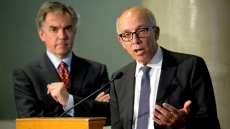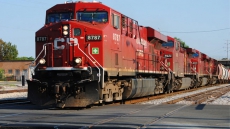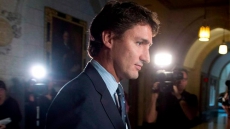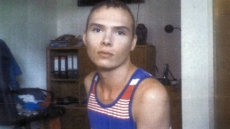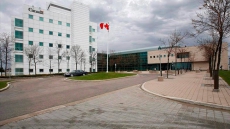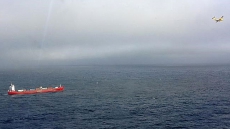OTTAWA - Gov.-Gen. David Johnston travels to Europe on Wednesday for a week-long visit that will include commemorations of two world wars, as well as discussions of trade and educational exchanges.
Johnston and his wife Sharon will visit Poland, the Netherlands and Belgium with a tight schedule of speeches, ceremonies and meetings.
The itinerary includes poignant stops at memorials marking Canadian sacrifices in the First and Second World Wars as well as down-to-earth talk on business and bilateral relations.
Canada has sent aircraft and small groups of soldiers to eastern Europe to reassure countries jittery about Russian President Vladimir Putin's sabre-rattling over Ukraine, but Johnston said his trip is not connected to those moves.
"It's clearly intended to reinforce the strong bilateral relations that we have with Poland and other European countries, particularly our NATO partners," Johnston said in an interview. "Poland has been one for 15 years."
The visits to war memorials come in a year which marks the centenary of the start of the First World War, which began with heavy fighting in Belgium, and the 75th anniversary of the start of the Second World War, which opened with the German invasion of Poland.
The tour begins in Warsaw, where Johnston will meet Polish President Bronislaw Komorowski and other government representatives for talks on Canada-Poland relations.
The Governor General will speak to students at the Warsaw School of Economics about greater co-operation between Canada and Poland in education and research.
He will place a wreath at Poland's Tomb of the Unknown Soldier and at a memorial dedicated to Canadian and Polish soldiers who fought together in the Second World War.
The trip includes a visit to the Auschwitz-Birkenau State Museum and Memorial to pay tribute to the millions of Jews and Poles killed at the Nazi camp there.
"Auschwitz we'll see for the first time," Johnston said. "It just represents so many dimensions of evil, and appropriately it has now been preserved as a memorial of how terrible consequences can occur when really evil people get to work."
In the Netherlands, the Johnstons will take part in ceremonies marking the Canadian effort to liberate the country during the Second World War.
"The last time I was in Holland in 2012, I was so struck by the firmness and the strength and the fierceness of the Dutch-Canadian relationship — particularly, of course, the Liberation of Holland, the battle of northern Europe where so many Canadians lost their lives."
In Belgium, the Johnstons will visit the Menin Gate war memorial in Ypres, which commemorates almost 60,000 Commonwealth soldiers killed in the area during the First World War who have no known graves.
They will attend an evening Last Post ceremony at the memorial. Every evening since Nov. 11, 1929, with the exception of the Second World War occupation of 1940-44, members of the local volunteer fire brigade have marched out in all weather to play the haunting notes of the Last Post on silver bugles.
Johnston said that ceremony will be a high point of his tour. He attended a similar ceremony in 2012 and was deeply moved. He said it's a ritual that is hallowed by its very longevity.
"My guess is it will go on in perpetuity."
In addition to the commemorations, Johnston will stress the importance of education exchanges between Canada and Europe.
The Governor General, a former law professor and one-time president of the University of Waterloo, has made education a major theme of his vice-regal office. He says education exchanges pay off down the road.
"If we want to enhance our trade with a particular country. the best single thing we could do would be to begin with education exchanges," he said.
"From that, you get layer upon layer of consequences that very often lead to very good trade relations."
